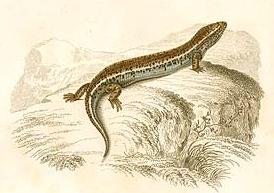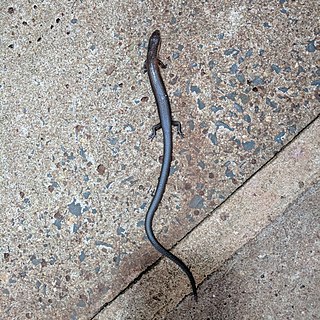
Chalcides is a genus of skinks.
Lacertaspis is a genus of skinks endemic to Central Africa.
Proscelotes is a genus of skinks. The genus is endemic to Africa.

The shovelnose frogs are the species of frogs in the genus, Hemisus, the only genus in the family Hemisotidae. They are found in tropical and subtropical sub-Saharan Africa. The shovelnose frogs are moderate-sized frogs, reaching a length of 8 cm (3.1 in). They are round-bodied, with short legs. Their heads are small and narrow, with hard, upturned noses.

Trachylepis is a skink genus in the subfamily Mabuyinae found mainly in Africa. Its members were formerly included in the "wastebin taxon" Mabuya, and for some time in Euprepis. As defined today, Trachylepis contains the clade of Afro-Malagasy mabuyas. The genus also contains a species from the Brazilian island of Fernando de Noronha, T. atlantica, and may occur in mainland South America with Trachylepis tschudii and Trachylepis maculata, both poorly known and enigmatic. The ancestors of T. atlantica are believed to have rafted across the Atlantic from Africa during the last 9 million years.
Gaston-François de Witte was a Belgian herpetologist who discovered and described at least 24 different species of reptiles. During his career, he was associated with the Royal Museum for Central Africa in Tervuren and the Museum of Natural Sciences in Brussels. He is best known for his research of amphibians and reptiles found in the Belgian Congo, from where he collected thousands of specimens. While in central Africa, he also collected botanical specimens.

Rudolf Grauer was an Austrian explorer and zoologist.

The Uganda five-toed skink is a species of lizard in the family Scincidae. The species is endemic to Sub-Saharan Africa.
Leptosiaphos amieti, also known commonly as the Cameroon five-toed skink, is a species of lizard in the family Scincidae. The species is endemic to Cameroon.
Leptosiaphos blochmanni, also known commonly as the Zaire three-toed skink, is a species of lizard in the family Scincidae. The species is native to Central Africa.
Leptosiaphos dewittei, also known commonly as De Witte's five-toed skink, De Witte's leaf-litter skink, and Witte's five-toed skink, is a species of lizard in the family Scincidae. The species is indigenous to Central Africa.
Leptosiaphos graueri, also known commonly as the Rwanda five-toed skink, is a species of lizard in the family Scincidae. The species is endemic to Africa.
Leptosiaphos hackarsi, also known commonly as Hackars' five toed skink or Hackars's five-toed skink, is an endangered species of lizard in the family Scincidae. The species is native to central Africa.
Laurenti's five-toed skink is a species of lizard in the family Scincidae. It is found in Zaire.

Leptosiaphos kilimensis, commonly known as the Kilimanjaro five-toed skink, is a species of lizard in the family Scincidae. It is found in Kenya, Tanzania, and South Sudan.
Witte's five-toed skink is a species of lizard in the family Scincidae. It is found in the Democratic Republic of the Congo.

The red five-toed skink is a species of lizard in the family Scincidae. It is found in the Democratic Republic of the Congo.
The Udzungwa five-toed skink is a species of lizard in the family Scincidae. It is found in Tanzania.
Leptosiaphos vigintiserierum, also known as the African five-toed skink, is a species of lizard in the family Scincidae. It is found in Cameroon and Equatorial Guinea (Bioko).







